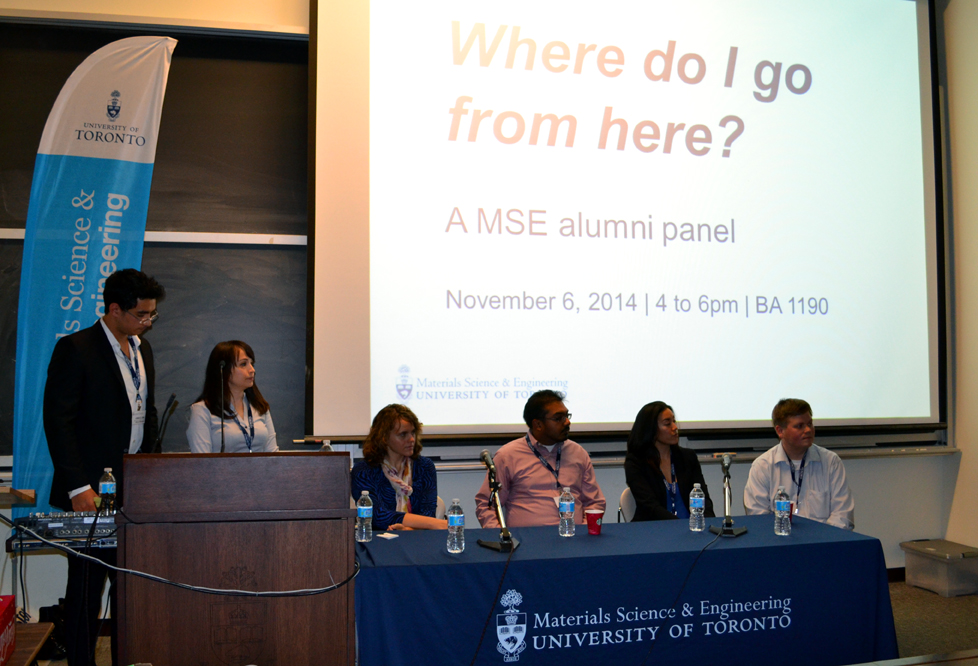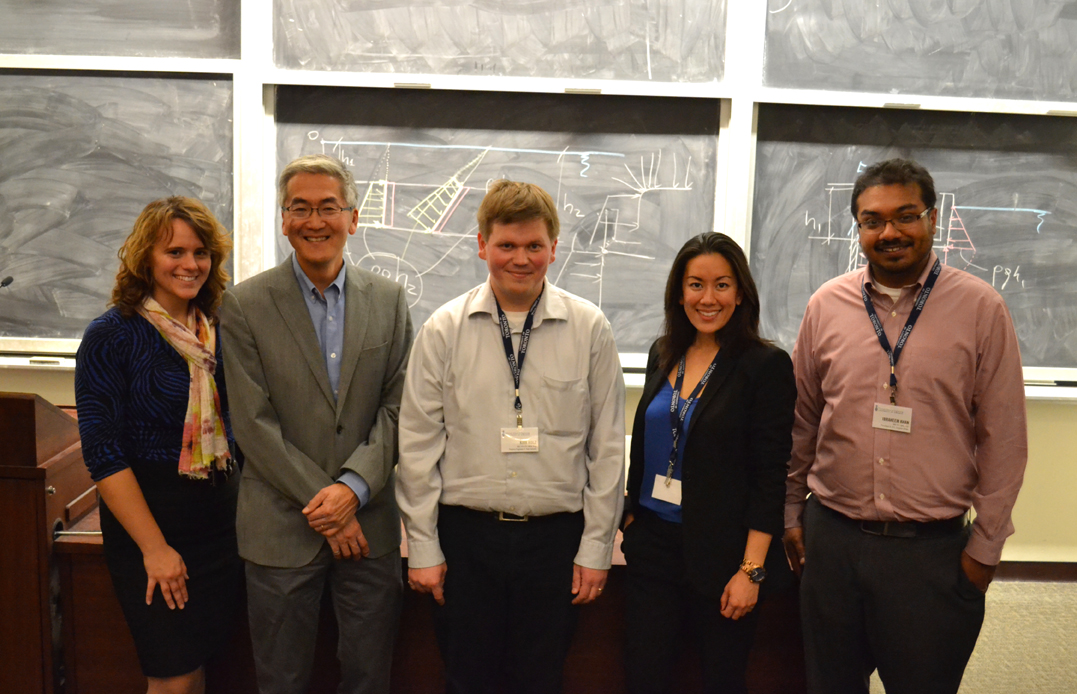MSE alumni share professional insights, inspiring next generation of U of T materials engineers
[sharexy]

Photo – MSE alumni panellists seated from left to right: Diana Mollicone (MSE 1T0), Ibraheem Khan (MSE 0T5), Jacqueline Lim (MSE 0T7) and Kirk Holz (MSE 0T5+PEY) with student panel moderators Ayman Elzoka and Sherry Esfahani
November 20, 2014
It can be difficult to see the light at the end of the tunnel when you’re typing out your plant design final report at four o’clock in the morning because its due in a few hours and it’s the fifth deadline you’ve had in the last week.
But, it could also be the ticket you need to land your first job.
Alumna Diana Mollicone (MSE 1T0), an applications engineer at IPEX USA LLC, a North American company that supplies thermoplastic piping for municipal, industrial and electrical applications, recalled taking exactly what she learned in class to jump start her career.
“My plant design project looked at the use of certain piping materials in steelmaking facilities. I brought the final report with me and prepared for a conversation around it at one of my first job interviews,” Mollicone said. “My interviewers were impressed—it landed me my first job at SNC-Lavalin as a piping engineer-in-training.”
“Transferable skills might sound like a cliché human resources term—but it’s real.”
Along similar lines, alumna Jacqueline Lim (MSE 0T7), an original equipment manufacturer (OEM) sales engineer at NSK Limited, a Japanese company that makes high-precision and industrial-grade bearings at 64 facilities across the globe, also echoed the importance of being able to illustrate transferable skills and applicable knowledge when you’re trying to demonstrate your suitability for a role.
“I was able to change jobs from an applications position into a technical sales role because I was able to prove two things. First, I knew the product inside-out from being an applications engineer. But more importantly, I had experience in providing technical support to customers and was able to effectively show that I could deploy similar attributes in a sales position. Transferable skills might sound like a cliché human resources term—but it’s real.”
Both Mollicone and Lim were part of a panel of U of T Materials Science & Engineering (MSE) alumni professionals who gathered on campus on November 6 as part of an annual event that provides current undergraduate and graduate students insights into the workforce.
Titled “Where do I go from here?”, Mollicone and Lim, along with alumni Kirk Holz (MSE 0T5+PEY) and Dr. Ibraheem Khan (MSE 0T5), answered questions from student moderators Ayman El-Zoka and Sherry Esfahani on topics ranging from reallocating for work to the pursuit of graduate education.
“Doing a doctoral degree isn’t for everybody. Don’t do it because you feel like you’re supposed to—do it because you want to.”
“Doing a doctoral degree isn’t for everybody,” said Dr. Khan, an entrepreneur who started his own company, Smarter Alloys, to commercialize an advanced materials technology he discovered during his PhD studies. “The years of research requires dedication and a specific personality type. Don’t do it because you feel like you’re supposed to—do it because you want to.”
At the end of the day, the most important objective is that students get a chance to hear from graduates who have come before them.

Photo—alumni panellists from left to right: Diana Mollicone, Kirk Holz, Jacqueline Lim and Ibraheem Khan with MSE Department Chair, Professor Jun Nogami (centre, left)
“My sincerest thanks to Diana, Jacqueline, Ibraheem, and Kirk for taking time out of their busy schedules to share their experiences with students,” said Professor Jun Nogami, Chair of the U of T Department of Materials Science & Engineering. “The opportunity for students to learn from the insights and accomplishments of alumni who are only a few years ahead of them can really inspire them and help guide their own career decisions.”
This was clearly reflected in the hour-and-a-half that both students and alumni stayed after the panel to network and have more in-depth dialogue with each other.